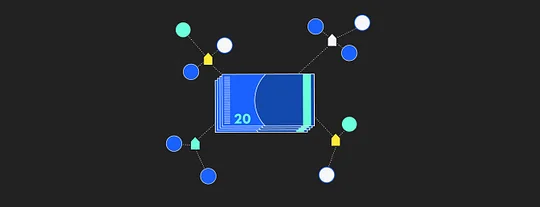Why is Eastern Europe so underbanked?

While chatting with my grandma on my annual trip to Romania this year, I had an epiphany. She is underbanked! So is my mom, uncle, cousin, and neighbour - you get the gist.
Nobody is unbanked, as in fully outside the banking world, but they’re ALL underbanked and only using a small proportion of the traditional and alternative financial services available. As it turns out, there are over 13m Europeans in this situation.
Why is this the case?
Take my grandma as an example. She is living in the countryside, using her farm to supplement her pension.
She does have a current account, but she only uses it to get government subsidies for the farm. Once a year, she goes to the bank’s headquarters and cashes out the entire sum that was wired to her. That is her only interaction with the banking world.
She doesn’t have a card because she doesn’t need it. The small shop in the village and the nearby town don’t accept card payments, and Romania has the highest interchange fees in Europe. There are no ATMs around her, so she just uses the card to store her money and withdraws only when she needs to spend.
You’d think that missing these basics might make her life less comfortable, but it isn't the case. The state pension can be wired to a bank account if you wish. She does not. It is the postwoman that comes over with a receipt and brings the cash instalment to her door every month for a small fee (2.5RON = around 50p).
You’d think that missing these basics might make her life less comfortable, but it isn't the case.
Then there’s the question of bills. Without using a current account, you can’t have a direct debit. But fear not, there is a person from the utility company that comes to read the meters every month and generates a paper statement. The postwoman then delivers the statement AND cashes the bill. Easy peasy.
My grandma comes from an era where your parents built and gifted you your house when you got married, so there was no need to ever use a mortgage. She has a deep distrust of debt and doesn’t even want to know about credit cards, overdrafts, or financing. Any small savings she might have live - you guessed it - under the mattress for extremely easy access. Three out of ten Romanians prefer it this way.
What’s the picture like elsewhere?
Of course, my grandma isn’t unique. Talking to my friend Ivet, I learned that her grandma, who lives in a small town in Bulgaria, doesn’t even hold a bank account, though she could make use of it. 28% of the Bulgarian population doesn’t have one. Ivet’s grandma prefers to use cash everywhere, walk to the bank desk to pay her bills, get her pension delivered to her door by post, and keep her savings in the closet. Distrust towards debt is deeply rooted in her. While countries like Venezuela, Italy, and the US have debt-to-GDP ratios of 350%, 156%, and 128%, Bulgaria has only 24.5%.
The story is similar in Poland. My friend Aga’s grandad lives in a village, and even though he has a bank account and card where he gets his pension wired, he likes to drive 15 minutes to the nearest ATM and withdraw it all. All spending and saving is done in cash.
These stories are weirdly similar to my village neighbour back in Romania. He is from my parent's generation and is employed. His salary is paid into a current account, but this one comes by default with a debit card that is needed to exchange money with his relatives overseas. In 2020, a total of 7,625,731,190 USD worth of remittances was received by Romania. My neighbour has two kids, and the state allowance can be wired or can be delivered in cash by the already all-too-popular postwoman. Any savings are kept in the current account because:
Everyone other than my grandma understands the mattress is not safe.
He does not dispose of amounts large enough to make it worth opening savings accounts. Two-thirds of Romanians don’t even have savings.
Speaking of my parents, their generation managed to pay off their mortgages due to the high inflation from the 90s, like many other Eastern Europeans. In fact, in 2019, 96% of Romanians owned the house they lived in, the highest number in all of Europe.
So, what do all these stories show?
Where there are underbanked, there are opportunities!
Where there are underbanked, there are opportunities!
In Eastern Europe, the rural population is significant. While the EU has an average rural population of 25%, Romania has 46%, Poland has 40%, and Croatia has 42%. These large rural populations present a good opportunity for embedded finance. Companies with boots already on the ground, like delivery services, can also use them for money transfer delivery services. The small shops can also embed paying bills or cashing out services.
Attitude to debt, in general, is unanimous, regardless of age, employment status, or living place. It is frowned upon! But mortgages are an evil you can’t avoid. Our grandparents and parents own their homes, so we can inherit them. Inheritance tax is low in the east compared with the west. In the UK, it sits at 40%, but only 7% in Poland, in Croatia at 5%, and in Hungary at 0%. But all those old homes are in need of extensive renovations, so specialised lenders could find a sweet spot here.
Attitude to debt, in general, is unanimous, regardless of age, employment status, or living place.
Even to my surprise, savings products are extremely rudimentary in Eastern Europe. Urban populations are generally wealthier, yet it’s quite popular to keep your savings in current accounts, just in case you might need them.
Most of the underbanked from this side of Europe live so by choice because anything else on offer isn’t good enough to sway them. But things don’t need to remain like this…
Stay tuned for part 2, dropping soon 👀.


